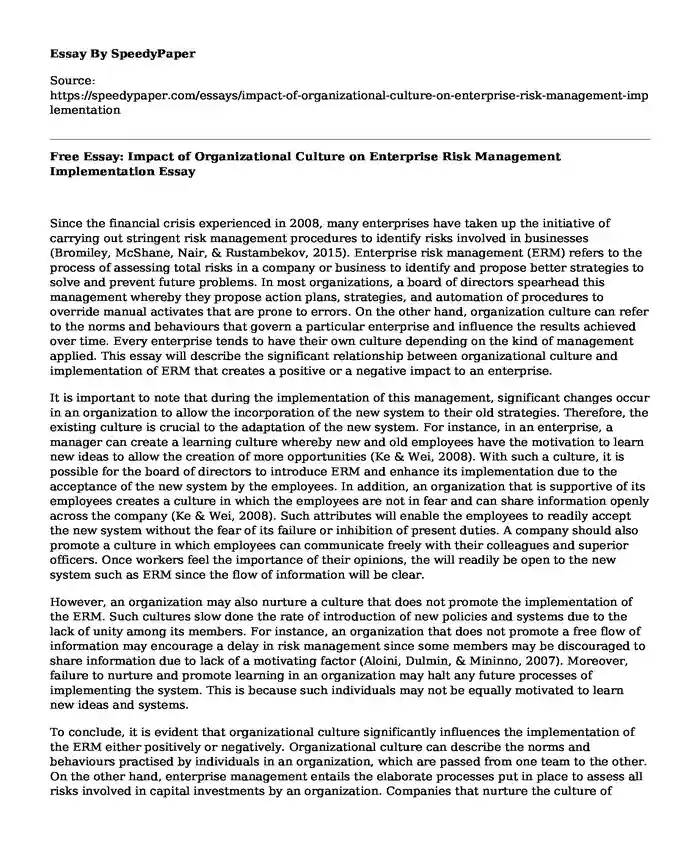
| Type of paper: | Essay |
| Categories: | Risk management Business strategy Crisis management |
| Pages: | 3 |
| Wordcount: | 654 words |
Since the financial crisis experienced in 2008, many enterprises have taken up the initiative of carrying out stringent risk management procedures to identify risks involved in businesses (Bromiley, McShane, Nair, & Rustambekov, 2015). Enterprise risk management (ERM) refers to the process of assessing total risks in a company or business to identify and propose better strategies to solve and prevent future problems. In most organizations, a board of directors spearhead this management whereby they propose action plans, strategies, and automation of procedures to override manual activates that are prone to errors. On the other hand, organization culture can refer to the norms and behaviours that govern a particular enterprise and influence the results achieved over time. Every enterprise tends to have their own culture depending on the kind of management applied. This essay will describe the significant relationship between organizational culture and implementation of ERM that creates a positive or a negative impact to an enterprise.
It is important to note that during the implementation of this management, significant changes occur in an organization to allow the incorporation of the new system to their old strategies. Therefore, the existing culture is crucial to the adaptation of the new system. For instance, in an enterprise, a manager can create a learning culture whereby new and old employees have the motivation to learn new ideas to allow the creation of more opportunities (Ke & Wei, 2008). With such a culture, it is possible for the board of directors to introduce ERM and enhance its implementation due to the acceptance of the new system by the employees. In addition, an organization that is supportive of its employees creates a culture in which the employees are not in fear and can share information openly across the company (Ke & Wei, 2008). Such attributes will enable the employees to readily accept the new system without the fear of its failure or inhibition of present duties. A company should also promote a culture in which employees can communicate freely with their colleagues and superior officers. Once workers feel the importance of their opinions, the will readily be open to the new system such as ERM since the flow of information will be clear.
However, an organization may also nurture a culture that does not promote the implementation of the ERM. Such cultures slow done the rate of introduction of new policies and systems due to the lack of unity among its members. For instance, an organization that does not promote a free flow of information may encourage a delay in risk management since some members may be discouraged to share information due to lack of a motivating factor (Aloini, Dulmin, & Mininno, 2007). Moreover, failure to nurture and promote learning in an organization may halt any future processes of implementing the system. This is because such individuals may not be equally motivated to learn new ideas and systems.
To conclude, it is evident that organizational culture significantly influences the implementation of the ERM either positively or negatively. Organizational culture can describe the norms and behaviours practised by individuals in an organization, which are passed from one team to the other. On the other hand, enterprise management entails the elaborate processes put in place to assess all risks involved in capital investments by an organization. Companies that nurture the culture of communication, a motivation of employees, and promote learning among new workers play a significant role in the implementation of the policy. However, those that do not promote such cultures have a higher likelihood of failure during ERM implementation due to lack of employee coordination.
References
Aloini, D., Dulmin, R., & Mininno, V. (2007). Risk management in ERP project introduction: Review of the literature. Information & Management, 44(6), 547-567.
Bromiley, P., McShane, M., Nair, A., & Rustambekov, E. (2015). Enterprise risk management: Review, critique, and research directions. Long range planning, 48(4), 265-276.
Ke, W., & Wei, K. K. (2008). Organizational culture and leadership in ERP implementation. Decision support systems, 45(2), 208-218.
Cite this page
Free Essay: Impact of Organizational Culture on Enterprise Risk Management Implementation. (2022, Nov 07). Retrieved from https://speedypaper.net/essays/impact-of-organizational-culture-on-enterprise-risk-management-implementation
Request Removal
If you are the original author of this essay and no longer wish to have it published on the SpeedyPaper website, please click below to request its removal:
- An Essay Sample about Ethics in Sports
- Free Essay on Director's Responsibilities of Care and the Skill
- Essay Example: Microsoft Corporation Research
- Free Essay Sample on NAHQ Code of Ethics
- Free Essay Exploring Job Stress and the Work-Life Balance of Working Women with Families
- Business and Law, Essay Example for Your Inspiration
- Intensity (Consequences of problem behavior on student, peers, instructional environment):
Popular categories




